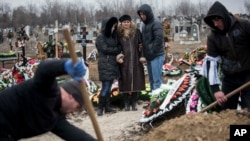A top U.S. official said Tuesday that the conflict in eastern Ukraine has become a battleground for a peaceful and free Europe.
"We all know that today, a Europe whole, free and at peace rises or falls with Ukraine. Ukraine’s front line for freedom is ours as well," Assistant Secretary of State Victoria Nuland told a gathering at the Washington-based Brookings Institution.
Washington and its European allies are reassessing their options in dealing with Russia's involvement in the conflict, after repeated violations of a cease-fire. Nuland's speech held a clear defiant note.
Russian President Vladimir Putin lashed out on Monday, blaming the West for the recent increase in violence, and accusing Ukraine's military of acting as a foreign NATO legion.
Stephen Sestanovich, an ambassador-at-large for the former Soviet Union, said overlaid onto a political fight between Moscow and Kiev is an increasing clash between Russia and NATO.
"That's a longer and potentially more damaging conflict for all sides," Sestanovich told VOA. "Putin has convinced himself and now many Western leaders are convincing themselves that this is a kind of fundamental line of division in Europe and it's not possible to go back."
Nuland noted that allied forces are now deployed on land, sea and air in Poland, Bulgaria and Romania, and that for the first time NATO is upgrading its rapid reinforcement capability along its eastern edge.
"We must install command and control centers in all six frontline states," she continued. "NATO is a defensive alliance. Our goal is deterrence of aggression. But if that fails, we have to be ready."
The United States and Europe have imposed a series of increasingly tough economic sanctions on Russia for its support of separatist rebels fighting in eastern Ukraine. Both Kiev and Moscow have accused each other of repeatedly violating a cease-fire signed September 2014. That cease-fire has all but collapsed.
According to Jeffrey Feltman, the U.N. undersecretary general, in the last week close to 50 civilians have been killed in the conflict and another 150 seriously injured. All together, 5,000 people have died in the conflict.
The U.S. has accused Russian-backed separatists of trying to seize more territory and move their line of control deeper and deeper into eastern Ukraine.
Sanctions and attempts at political reconciliation have so far failed.
Sestanovich says many experts, including himself, consistently have underestimated the dimensions of the conflict. "For me it made sense for Putin to try to scale back the conflict and the confrontation with the West. How much could he really gain by it? Again and again, he's proved us wrong," he said.
Professor Aurel Braun of the University of Toronto, who specializes in Russia-NATO relations, says Russia's excuse for the fight is NATO expansion, but that Mr. Putin's primary concern is having on the Russian border a Slavic state that successfully became a modern European democracy.
Braun warns that the West's sanctions response is inadequate. "[Russia has] initiated a very aggressive and diversionary policy which is being emboldened not by Western strength but fueled by Western weakness. It's a very, very dangerous situation and I think by not reacting now, the West may have to react in a much more painful and risky way in the future," said Braun.
Russia has insisted that force cannot resolve the conflict, and has called on Kiev to negotiate with the separatists. The rebels, backed by Russian artillery and trainers, have called on Russia to take in the eastern Ukrainian region of Donetsk.
Moscow in 2014 annexed Ukraine's southern autonomous republic of Crimea.
As of now, Ukraine's requests for lethal military aid from the West have gone unanswered. But Secretary Nuland would not predict where Washington's policy would go.
"What we want to see is the violence end so we don’t have to come to that point. But if the restraint that others have shown is not matched, obviously we have to review what we are doing," she said.
But Nuland said there is an easy way for the violence to end, and for Moscow to restore ties with the West.
"It's very, very simple," she said. "The minute Russia allows Ukraine to control its side of the international border and stops fueling the conflict, the situation will improve. The weapons and fighters will stop, hostages will come home, sanctions can start to roll back, and the fight that Moscow calls an intra-Ukrainian problem will actually become truly that.”





